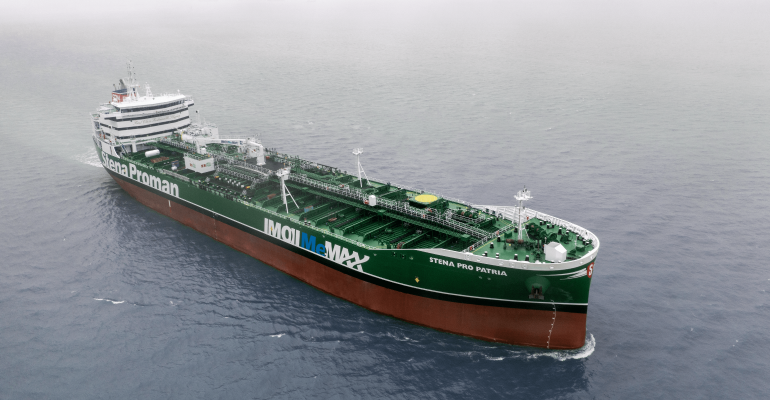The first vessel delivered to the partnership of Stena Bulk and methane producer Proman is the 49,990 dwt Stena Pro Patria, first in a series of six dual-fuel MR tankers under construction at Guangzhou Shipyard International (GSI) in China.
Anita Gajadhar, MD of Proman Shipping, Marketing and Logistics told Seatrade Maritime News that initially, these vessels will achieve a CO2 reduction of up to 15% by using currently available methanol.
“This saving has the potential to increase over time as new sources of methanol come online, including low-carbon and renewable methanol. It’s also important to focus on the wider positive sustainability impact that these vessels will have: methanol will enable the total elimination of SOx and Particulate Matter and will cut NOx emissions by 60%. Shipping’s sustainability challenge is wider than carbon and methanol is a powerful solution to help cut other pollutants associated with maritime trade,” said Gajadhar.
The company said that methanol is available at over 100 ports around the world, including the major bunkering ports.
“Stena Pro Patria will complete her first methanol fuel loading in South Korea, which is not known as a methanol producing region,” said Gajadhar.
“We believe that this is a clear demonstration of the widespread availability of methanol as a marine fuel. Of the more than one hundred ports in the Americas, Europe, and Asia where methanol is available, Proman already delivers to more than 50 of these. Proman is also actively working on expanding storage capacities globally and establishing bunkering guidelines and infrastructure for both truck to ship bunkering as well as ship to ship bunkering,” added Gajadhar.
Proman already produces low-carbon methanol at its Trinidad plants by recycling CO2, and a world-scale renewable methanol plant is under construction.
“We are also evaluating multiple low-carbon and renewable methanol projects in the UK, North and South America and elsewhere. Proman is committed to developing a pipeline of low-carbon and renewable methanol production to serve the marine market’s demand and support the wide-scale transition to cleaner fuels,” said Gajadhar.
Whether fossil fuel, low carbon, zero carbon, green or blue, methanol is homogenous and so the appropriate engines can burn the fuel regardless of its origin. This bring the possibility of lower emissions over time as well-to-tank emissions are reduced by greener ethanol production methods.
Erik Hånell, President & CEO, Stena Bulk, said: The carriage of methanol as a cargo is commonplace and well understood on IMOIIMAX vessels, and falls under normal chemical carrier regulations. For these methanol carriers, we conducted additional training related to the use of methanol as a marine fuel in addition to the normal training we would carry out for chemical carriage.
“We were able to do this because of Stena’s wider experience developing and implementing methanol as a marine fuel on the Stena Germanica in 2015; experience that has been instrumental in getting these joint venture vessels on the water and ready for operation.”
Stena Pro Patria is equipped with MAN dual-fuel engines with continually controlled combustion, and optimised tuning.
David Cassidy, Chief Executive of Proman, said: “The vessel’s state-of-the-art fuel consumption and engine technology are important steps towards more sustainable shipping. It will be vital as new low-emission fuels emerge to also focus on energy efficiency.”
Copyright © 2024. All rights reserved. Seatrade, a trading name of Informa Markets (UK) Limited.
Add Seatrade Maritime News to your Google News feed.  |

